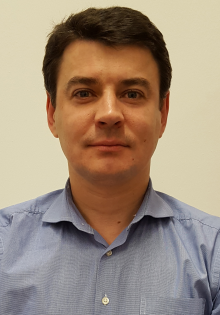Fields and Waves (L.048.90101), summer semester 2016
Usually taken as compulsory course by students of the Electrical System Engineering Master (ESE) program with "Electronics & Devices" focus at the University of Paderborn in the their first or second semester.
Sign up to the lecture and the exam (separately) via PAUL.
Topics
Following the current Module Handbook these topics are covered:
- Basics (Maxwell's equations, constitutive relations, continuity, energy),
- electrostatic fields and boundary value problems, plane waves (basics, reflection, Snell's law and Fresnel formulas),
- dispersion,
- modes in coaxial lines and hollow waveguides,
- radiation of waves
To follow the course you should have a solid knowledge in the relevant mathematical basics (vector calculus: inner&outer product, div/rot/grad, Integral theorems of Gauss&Stokes; solutions of ODEs & PDEs) and in Field Theory (Electro- and Magnetostatics).
If you have a formal prerequisite of "Field Theory"/"Feldtheorie" mentioned in your acceptance letter, please see the FAQ page.
Lecture
Mondays 14:15-15:45, room P1.5.01.4
Since this is compulsory course with many students, the schedule cannot be changed. If you have a schedule collision with another course please ask the other lecturer to move his/her course.
Lecturer: Prof. Dr. J. Förstner and Dr. Viktor Myroshnychenko
A Tablet-PC will be used to do the lecture. The handwritten lecture notes are uploaded to koaLA as PDF.
Problem Sheets (Homeworks)
Published weekly on Tuesdays morning in koaLA. Solutions can be submitted for correction after one week (into mailbox in front of room P 1.5.17.2, emptied Tuesdays 9:00, i.e. BEFORE the tutorial class, only in paper, no late submissions accepted) . The problems sheets are then discussed in the exercise.
Exercise groups (Tutorials)
Tuesdays 11:15-12:45, P7.2.02.1, Dr. Yao Kou
Exam
Wednesday, 03rd Aug 2016 starting 09.00 h - 11.30 h am at lecture hall P7.2.03.
By solving and submitting of the exercises additional bonus points (10%) can be obtained for the written exam (to be precise: bonuspoints_exam=10%*max_points_exam*reached_points_problemsheets/ max_points_problemsheets).
If you want to participate, make sure you are signed up in PAUL for the written exam ("Klausur").
You can bring one DIN A4 sheet of paper, handwritten on both sides with own notes to the exam. No copies or prints. Except for pens and rulers, no other tools (especially not calculators or phones) are permitted. The exam will be a mix of different questions (multiple choice, calculations, sketches, explanations, short derivations) on the topics of the lecture and the tutorial classes. If you did the problem sheets yourself and followed the lecture you should have no problem solving the questions.
Communication
For office hours and contact data please have a look at the website of the TET group.
Current information and circular mails are published via
koaLA
. There a forum and Wiki area will be created for communication also between students and additional material like lecture notes and problem sheets are uploaded. Everyone signed up in PAUL and having a koaLA account should be in the koaLA group automatically. To be added to the group manually, please send us your IMT login name.We are always thankful for suggestions regarding the course.
Literature
- D.J. Griffith "Introduction to Electrodynamics" (Addison Wesley): Very systematic and good explanation of the concepts. Highly recommended for Electrostatics and Magnetostatics. Unfortunately the English version is quite expensive.
- Lecture notes by Prof. Schuhmann (now TU Berlin) - approach very close to this lecture. but concepts not explained in detail.
- J.D. Jackson "Classical Electrodynamics" - THE standard textbook. Every aspect is intensively and precisely discussed on a quite level, sometimes missing plenty steps in derivations. Excellent, but not really suitable for beginners (maybe as a reference book).
- Note that there are plenty good introductory textbooks about the theory of classical electrodynamics. If you already own one, it probably is enough as additional literature for the lecture).
Additional literature will be mentioned in the lecture and exercises.


